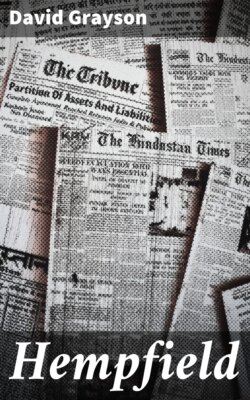Читать книгу Hempfield - Grayson David - Страница 8
На сайте Литреса книга снята с продажи.
I DISCOVER THE PRINTING-OFFICE
ОглавлениеTable of Contents
For years my sister Harriet and I confined our relationships with the neighbouring town of Hempfield to the Biblical "yea, yea" and "nay, nay," not knowing how much we missed, and used its friendly people as one might use an inanimate plough or an insensate rolling-pin, as mere implements or adjuncts in the provision of food or clothing for our needs.
It came only gradually alive for us. As the years passed the utilitarian stranger with whom we traded became an acquaintance, and the acquaintance a friend. Here and there a man or a woman stepped out of the background, as it were, of a dim picture, and became a living being. One of the first was the old gunsmith of whom I have already written. Another was Doctor North—though he really lived outside the town—whom we came to know late in his career. He was one of the great unknown men of this country; he lives yet in many lives, a sort of immortality which comes only to those who have learned the greatest art of all arts, the art of life. The Scotch preacher, whom we have loved as we love few human beings, was also in reality a part of the town, though we always felt that he belonged to our own particular neighbourhood. He was ever a friend to all men, town or country.
It has always been something of a mystery to me, when I think of it, how I happened for so long to miss knowing more about old Captain Doane, and MacGregor, that roseate Scotchman. It is easier to understand why I never knew Anthy, for she was much away from Hempfield in the years just after I came here; and as for Norton Carr and Ed Smith, they did not come until some time afterward.
I shall later celebrate Nort's arrival in Hempfield—and may petition the selectmen to set up a monument upon the spot of this precious soil where he first set a shaky foot.
I lived before I knew Anthy and Nort and MacGregor and the old Captain, but sometimes I wonder how I lived. When we let new friends into our lives we become permanently enlarged, and marvel that we could ever have lived in a smaller world.
So I came to know Hempfield, and all those stories—humorous, tragic, exciting, bitter, sorrowful—which thrive so lustily in every small town. As we treasure finally those books which are not, after all, concerned with clapping finite conclusions to infinite events, but are content to be beautiful as they go (as truth is beautiful), so I love the living stories of Hempfield, nor care deeply whether they are at Chapter I, or in the midst of the climax, or whether they are tapering toward a Gothic-lettered "Finis." Only I have never once come across any Hempfield story that can be said to have reached a final page. Every Hempfield story I know has been like a stone dropped in the puddle of life, with ripples that grow ever wider with the years. And I esteem it the best thing in my life that I have had a part in some of those stories: that a few people, perhaps, are different, as I am different, because I passed that way.
How well I remember the evening when my eye was first caught by the twinkle of that luminary, the Hempfield Star, with which afterward I was to become so intimately acquainted. It came to me like a fresh breeze on a sultry day, or a new man in the town road. It was a paragraph in the editorial page, headed with a single word printed in robust black type:
